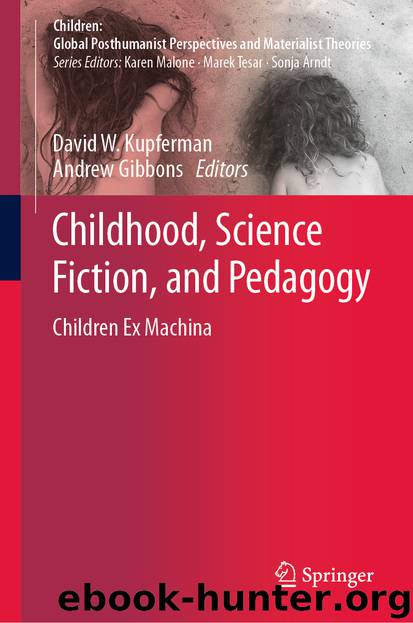Childhood, Science Fiction, and Pedagogy by David W. Kupferman & Andrew Gibbons

Author:David W. Kupferman & Andrew Gibbons
Language: eng
Format: epub
ISBN: 9789811362101
Publisher: Springer Singapore
The embodiment of the affective encounter illuminates a seemingly contradictory quality where the material object provokes in different yet related ways. This new recognition does not displace the echoes of the previous “glowing” affect . MacLure experienced the sensation of data as a thing calling her back, demonstrating the “thing-power” (Bennett, 2010) while remaining cognizant of its affective quality. The dynamic implies an opening to recognize that nonhuman objects and entities engage as much with us as we do with them. Oftentimes, these sensations can act as catalysts to reticulate approaches to considering educational issues; for ambiguity edges out assumed control, since “in a materialist ontology, data cannot be seen as an inert and indifferent mass waiting to be in/formed and calibrated by our analytic acumen or our coding systems. We are no longer autonomous agents, choosing and disposing” (MacLure, 2013, p. 660). This disruption of habit reiterates the tenuous assumptions held regarding legitimate ways of doing research and producing knowledge, “as if we have chosen something that has chosen us” (MacLure, 2013, p. 661). The intra-twining perspectives of affect and new materialism provide ways to readdress normative approaches to conceptualizing the process of education, from complicating static determinations of learning to emphasizing the politics and ethics implied in the process. Affect grabs and stays with you: the stickiness of the ambiguous what-was-felt (Ahmed, 2010, p. 29; Watkins, 2010).
The theoretical approach to affect here is indebted to Deweyian usages that emphasize the pragmatic attention to experience (Gregg & Seigworth, 2010, p. 8) and the Spinozan undercurrent of monism (Spinoza, 1994), which recognizes embodied capacities. From a pedagogical perspective, Watkins (2010) revisits Spinoza’s distinction between affectio and affectus: “Affectio may be fleeting but it may also leave a residue, a lasting impression that produces particular kinds of bodily capacities” (p. 269). The concept of “residue” is important for “it suggests that we grapple with this as a pedagogic process, whereby a sense of self is formed through engagement with the world and others and the affects this generates” (pp. 269–270). The ephemeral nature of affect , although resistant to prescriptive efforts to purposely enact solutions, may not be as fleeting as suggested. The pedagogical perspective implies some manner of relationship, whether it is with data (MacLure, 2013) or as a student–teacher dynamic (Watkins, 2010). Perhaps this is “what transpires when the patho-logy of a body intersects with the pedagogy of an affective world (as they mutually constitute a rhythm, contour, shape, timing” (Gregg & Seigworth, 2010, p. 15). Using affect and new materialism as guiding frameworks for this examination of two comic series, it is possible to sift through the provocations of affect suggested by interaction with the material comic itself and the meanings this exploration holds for reconsidering educational habits.
Paying attention to the materiality, the sensations of the comics, and feeling pedagogical spaces they subsequently support holds significance when considering educational settings. To focus on the process and affect , not just the content of an object of examination, allows for the exploration of aspects and complexities that engage with the indeterminacy of experience.
Download
This site does not store any files on its server. We only index and link to content provided by other sites. Please contact the content providers to delete copyright contents if any and email us, we'll remove relevant links or contents immediately.
The Art of Coaching Workbook by Elena Aguilar(51161)
Trainspotting by Irvine Welsh(21643)
Twilight of the Idols With the Antichrist and Ecce Homo by Friedrich Nietzsche(18622)
Fangirl by Rainbow Rowell(9229)
Periodization Training for Sports by Tudor Bompa(8253)
Change Your Questions, Change Your Life by Marilee Adams(7759)
This Is How You Lose Her by Junot Diaz(6877)
Asking the Right Questions: A Guide to Critical Thinking by M. Neil Browne & Stuart M. Keeley(5759)
Grit by Angela Duckworth(5604)
Red Sparrow by Jason Matthews(5467)
Paper Towns by Green John(5179)
Room 212 by Kate Stewart(5105)
Ken Follett - World without end by Ken Follett(4723)
Housekeeping by Marilynne Robinson(4436)
The Sports Rules Book by Human Kinetics(4379)
Papillon (English) by Henri Charrière(4262)
Double Down (Diary of a Wimpy Kid Book 11) by Jeff Kinney(4261)
The Motorcycle Diaries by Ernesto Che Guevara(4089)
Exercise Technique Manual for Resistance Training by National Strength & Conditioning Association(4061)
